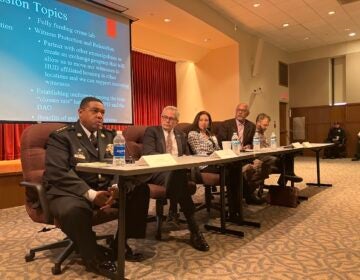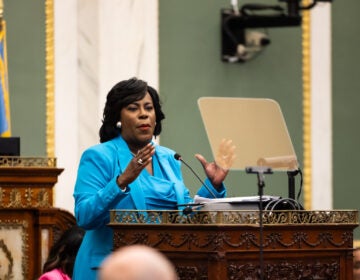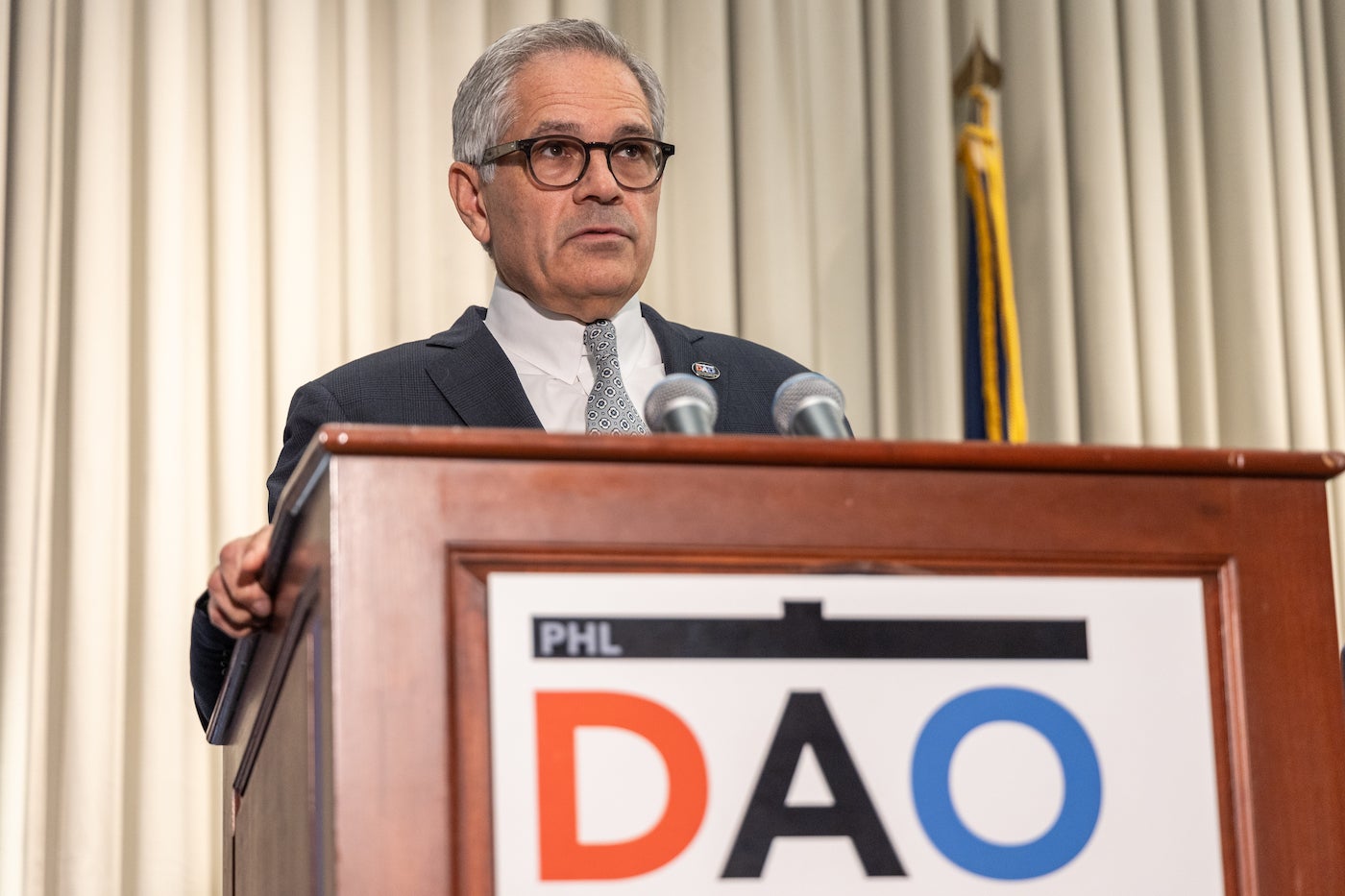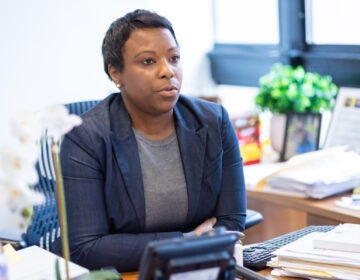Who cleans up after shootings? Philly hires professionals to handle blood in the streets after years of residents shouldering the work
When someone is shot on a Philadelphia street, residents often handle the crime scene. City leaders are piloting a new protocol to help.
Listen 4:43
File - Remnants of crime scene tape on Brown Street in North Philadelphia where 5 were wounded in a shooting at a block party in August, 2020 (Kimberly Paynter/WHYY)
This story is a part of the Every Voice, Every Vote series.
What questions do you have about the 2023 elections? What major issues do you want candidates to address? Let us know.
On a June evening in 2022, a shootout erupted between several men on a quiet side street in South Philadelphia’s Point Breeze neighborhood.
Addie Dempsey, 75, had just brought her grandchildren in from playing outside when they heard gunshots. They waited while the Philadelphia Police Department arrived and left.
She later learned her 36-year-old grandson, Raheem Hargust, was one of two men killed on the block.
The next morning, she and two neighbors saw there was still blood on the sidewalk. They brought out brooms, buckets and gloves and got to work.
“Wasn’t nobody else out there to do it, so I did,” she said.
In Philadelphia neighborhoods where shootings are frequent, loved ones of victims often undertake the hazardous and traumatic work of cleaning up blood and other biological waste in the midst of grief. The Philadelphia Police Department will soon launch a pilot program to provide that service when violence occurs in an outdoor public space.
City agencies and nonprofit groups have been raising the alarm about this problem for the last two years, according to public meeting recordings, reports, and other documents obtained by WHYY News.
At a March 2021 hearing of the City Council’s Committee on Public Safety, representatives from the Anti-Violence Partnership of Philadelphia presented a report called “Blood on Our Hands.” It included recorded testimony and images from clients forced to clean up blood and other remains after losing a loved one.
“It’s about the compromised issue of safety and security and well-being that is constant, it’s about chronic cumulative Black death,” said Tanya Sharpe, an associate professor of social work at the University of Toronto who contributed to the report. “It is also about not allowing individuals the right to grieve when we understand the frequency at which it occurs.”
‘No process’
Under current protocols, a Philadelphia Police Department officer responding to a shooting in a public space may request a “washdown” from the Philadelphia Fire Department, according to Francis Healy, PPD’s special advisor to police commissioner.
He noted the wash is “really nothing more than our hose pushing things down the sewer, which is not the appropriate way to do these things.”
“The current process is no process, and that’s not acceptable,” he said.
The Philadelphia Fire Department could not provide WHYY News with a list of how many power washes they performed after homicides and where those washes occurred.
Healy is designing a pilot program with a contracted professional cleanup service that he hopes will launch this fall.
Some community members say this should have happened a long time ago.
“There’s no respect even given to the dead because of who’s dying,” said Reuben Jones, director of gun violence prevention nonprofit Frontline Dads. “If it happened in the Jewish neighborhood, the Gayborhood … any neighborhood in this city other than poor Black neighborhoods, there would be a different response.”
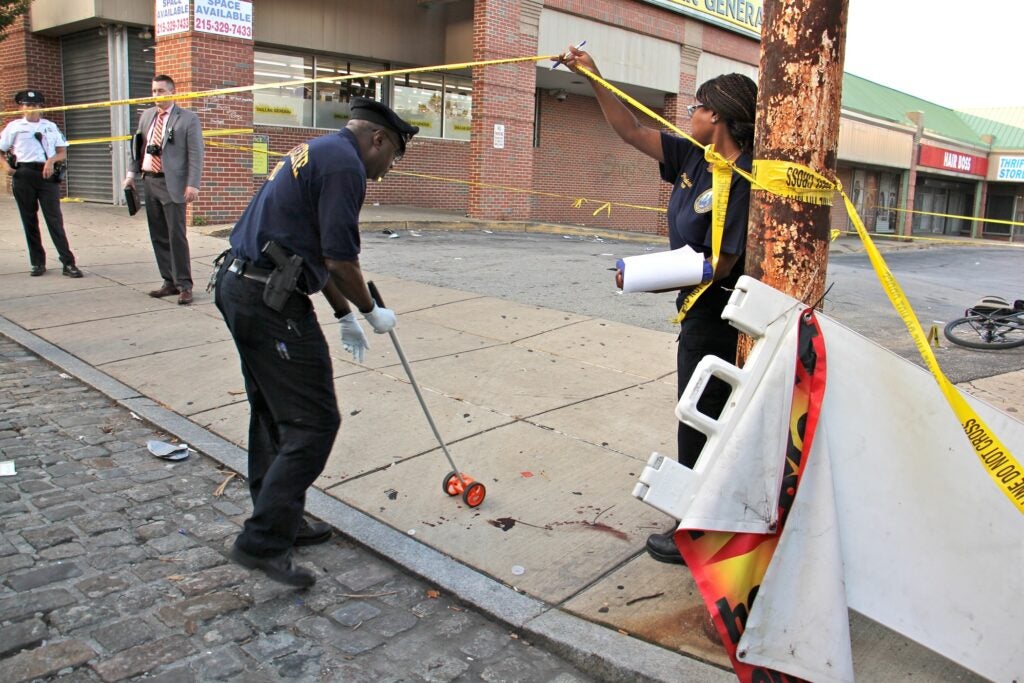
In 2022, Adara Combs created the city’s Office of the Victim Advocate to address the needs of people who’ve been harmed by gun violence and other crimes.
She says a colleague in the Office of the Inspector General alerted her to the gap in protocol for crime scene cleanup, and she started advocating for funding to address it.
“Obviously no one wants a community member to be out on the streets on their hands and knees cleaning up a crime scene,” Combs said. “So that’s why we fought so eagerly to address this issue as soon as we had the opportunity and the finances to do so.”
PPD is currently finalizing a contract with a professional cleanup company. Starting this fall, detectives who arrive at a scene with blood or biowaste will notify police radio, and staffers there will document the request. Police radio staffers will call the contracted cleaning company, and two officers will stay at the scene for 90 minutes or until the company arrives, according to Healy.
The protocol will only apply to shootings that happen outside. The city Managing Director’s Office said via email that the goal is “to finetune the process and learn from this phase before going into private residences of traumatized families.”
The Philadelphia Housing Authority already has a crime scene cleanup contract for shootings that occur in their units. They also refer residents to counselors and other resources, according to a department spokesperson.
Individual homeowners may be able to use their own insurance or the state’s Victims Compensation Assistance Program to pay for services. Advocates say the funding available hardly covers the cost, which the Anti-Violence Partnership of Philadelphia (AVP) estimates at anywhere between $2,000 and $20,000.
In 2021 AVP recommended city leaders either create a cleanup team to handle public crime scenes or coordinate with private contractors to get biowaste cleaned up. They identified eight ZIP codes most impacted by homicide that should receive the pilot first.
Healy hopes to have the pilot for public shootings in place in the 24th and 25th police districts this fall.
“We’re trying to make sure we have a rock-solid policy,” he said. “I want to make sure [the vendor] can actually handle the volume… This is a radical change in how we do business.”
There have been more than 1,400 shootings in Philadelphia this year, 335 of them fatal, according to the Office of the Controller. The city is putting $500,000 into the pilot program and is working toward finalizing an annual budget for crime scene cleanup, according to Combs.
Adam Geer, deputy inspector general for public safety with the city of Philadelphia, said it’s crucial that PPD expand the pilot program to all districts as soon as possible.
“If they’re calling and they’re happy with the contractor, let’s keep it moving,” he said.
Dempsey, the grandmother from Point Breeze, says shootings are part of life in her neighborhood, and they aren’t going to stop. There’s still a bullet hole in her living room from the day her grandson was shot.
She hopes next time a shooting leaves pools of blood on her block, she won’t be the one to clean it up.
“I was angry that I had to do it,” she said. “The police should have somebody to do that, instead of the family.”
Mental and physical damage
It is unlikely that family members or other co-victims are able to adequately protect themselves and fully remove all biohazards during crime scene cleanup, said Scott Vogel, a certified instructor with the American Bio Recovery Association who teaches other cleaning technicians how to follow industry standards.
“If we’re not cleaning it up properly … it’s a risk,” he said. “And when you’re looking at kids at lick surfaces, when you look at kids playing in areas… it is a public health issue.”
Paul Jackson grew up in North Philly. He says on his block, it was common to see neighbors, especially elderly women, cleaning up blood. He says his grandma once assigned him to clean their stoop after a shooting.
He also remembers the reddish-pink water running down into the storm drains.
“The trauma of the killing, the trauma of her having to wash that down while kids are running by and seeing it happen,” said Jackson, now a consultant and community organizer who works with nonprofit Frontline Dads. “If you are from North Philly, West Philly, a lot of people grow up seeing that and you don’t think it’s trauma until later on.”
Exposure to blood and other remains in the aftermath of a shooting can cause long-term problems such as depression, anxiety, and PTSD according to Sharpe, who founded the Centre for Research & Innovation for Black Survivors of Homicide Victims.
She said she’s met survivors who are hypervigilant, who have night and day terrors about the blood splatter, who often worry their clothing is blood-stained when it’s totally clean.
“Smells are triggering, sounds are triggering,” she said. “It does a whole lot.”
Who foots the bill?
In Pennsylvania, people who’ve lost a loved one to a shooting may be able to use funds from the state’s Victim Compensation Assistance Program to hire a service. But there’s a $500 cap per victim, and victims can only use it to pay for cleanup of a private residence.
The program used to only cover interior locations, but in 2021 the state expanded the policy to include hallways, stairwells, and outdoor areas that a victim is responsible for maintaining, according to a representative from the Pennsylvania Commission on Crime and Delinquency. Cleanup of a victim’s parking space or storage area is also eligible.
But few take advantage of the option, and denials are common.
Alexandra Abboud, Pennsylvania manager for a national nonprofit called Crime Survivors for Safety and Justice, says her organization is currently pushing the state to increase the reimbursement cap from $500 to $5,000.
“We just successfully did it in Michigan,” she said. “So those are the numbers that we are calling for as a step in the right direction.”
Indiana and Kansas have already passed laws to add crime scene cleanup to the list of acceptable expenses, according to a recent report from Abboud’s organization.
Technician and cleanup company owner Scott Vogel says there’s been a push for state legislation that requires cities to hire professional contractors for this work. He’s currently pursuing a doctorate in policies related to biological emergency response and hopes to work with New Jersey lawmakers to establish a statewide protocol.
“We talk about the shootings, but we don’t talk about the victimization of after,” he said. “And that is a huge aspect and a huge miss.”
Reuben Jones at Frontline Dads says the city should work directly with families to help them handle gun violence victims’ remains in whatever way they choose.
“When you gotta wash human blood down the drain like it’s a movie or a slaughterhouse situation, it’s a lack of care and concern for the loss of human life.”
 This story is a part of Every Voice, Every Vote, a collaborative project managed by The Lenfest Institute for Journalism. Lead support is provided by the William Penn Foundation with additional funding from The Lenfest Institute, Peter and Judy Leone, the John S. and James L. Knight Foundation, Harriet and Larry Weiss, and the Wyncote Foundation, among others. Learn more about the project and view a full list of supporters here.
This story is a part of Every Voice, Every Vote, a collaborative project managed by The Lenfest Institute for Journalism. Lead support is provided by the William Penn Foundation with additional funding from The Lenfest Institute, Peter and Judy Leone, the John S. and James L. Knight Foundation, Harriet and Larry Weiss, and the Wyncote Foundation, among others. Learn more about the project and view a full list of supporters here.

Get daily updates from WHYY News!
WHYY is your source for fact-based, in-depth journalism and information. As a nonprofit organization, we rely on financial support from readers like you. Please give today.


